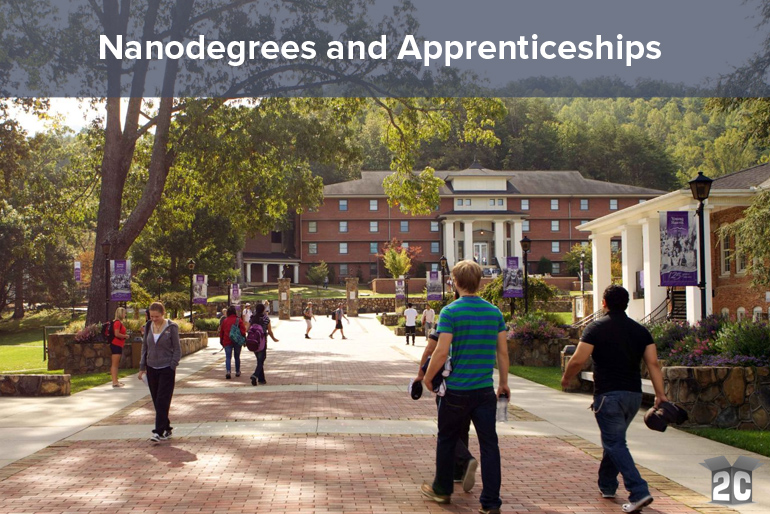
Recently, I posted an article about companies who are taking on the responsibility to train skilled workers. In it, I didn’t mention the education gap. That, too, has had a devastating affect on our workforce, and the ability of CEO’s to find qualified employees.
Nanodegrees and Apprenticeships
But what qualifies as career-making education? We suggest that nanodegrees and apprenticeships do, in conjunction with, and/or separately from, a Liberal Arts education. Especially in high-tech fields.
Apprenticeships Breed Innovation
In the days of yore, the apprentice not only learned a trade, but he ate meals with the family, he learned their social mannerisms, the way they thought, and about ideas and innovation.
Granted, it only takes reading a Charles Dickens’ novel to know that this wasn’t always the way it worked, but certainly some of the great painters, scientists, and inventors through history tell of the things they learned and the relationships they built with the experts of their day, until they, in turn, became the expert.
Fast forward to today. AT&T and Udacity announced a new (old) method of learning for a modern world.
Nanodegrees – Today’s Apprenticeships
Nanodegrees are mini-degrees that you can acquire throughout your career, in 6-12 months, without taking time off.
These are select hands-on courses to enhance the skills of an employee involved in industry or a capstone project, and includes career guidance.
They are so efficient, you can get a nanodegree as you need it, and earn new ones throughout your career. Even if you need to switch paths, since a career isn’t always a straight line.
It has the potential to be an extremely efficient way to train the next generation of workers, and for many could provide a way to avoid a prohibitively expensive college degree.
Passing the Baton to the Next Generation
2C is in the website development industry where learning has to happen at the speed of light. That is why bringing in new (young) blood is paramount to its future success.
We have to pass the baton in the internet industry in order to avoid getting left hopelessly behind. However, this goes for many industries and sectors, as things become faster, smaller and robotic. McKinsey estimates there will be “a shortfall of 85 million skilled jobs globally in 2020 driven by the rapid changes in technology.”
In a typical 7 year apprenticeship of the past, flexing to meet marketing challenges of a changing culture, a war, disease, and pestilence would have been part of what the apprentice would learn to work around. Albeit, he or she didn’t have to learn at the speed of light, it certainly showed them more life experience than 4 years partying at the best college would.
We have to close the skilled job shortfall!
We have to start recognizing that many of our educational offerings are not enough to establish the love of life-long & accelerated learning, especially for low-income youth. Early intervention has to be a top priority.
However, corporations and schools alone cannot make up for all the lacks of parenting, social culture and poverty in our nation.
Partnerships between Industry and Local Organizations
Traci Donnelly is the CEO and executive director of The Child Center of NY, a nonprofit in New York City that annually helps more than 18,000 at-risk children and youths succeed in life.
“If you give our kids a chance by offering them meaningful internships and apprenticeships, we in the nonprofit sector can, in return, give these interns and apprentices the support they need to succeed. In effect, we can help to insure your investment in them.”
Knowing that there was social support for the internships that corporations will offer is a big step forward in solving the issue.
She goes on to say, “Our mentors help youth (as early as middle school) discover what they are good at and want to do, and then help them build the confidence, discipline, and social-emotional skills they need to do it. But what we cannot do is offer our young people high tech jobs. For this, we need businesses.“
In Closing
I believe that creative partnerships between local high-tech businesses and programs like this are creative ways to solve this national problem. I also believe that offering lower cost, highly available nanodegrees and apprenticeships are also part of the solution.
Where do you land on this equation? Hard and fast 4 year degree, or more creative, less expensive ways to get to one’s career?

